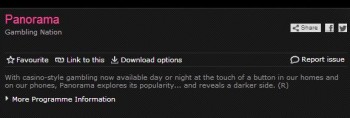
The BBC had to re-edit its Panorama program "Gambling Nation" because its anonymous source was identified. (Credit: BBC, screenshot)
The BBC promised to give a “gambling addict” anonymity if he would be interviewed by the network’s Panorama program for a feature on “gambling addiction,” but the BBC didn’t do a good job of holding up to its promise, UK regulator OfCom found.
According to a recent report from OfCom, the BBC violated the person’s privacy with its Nov. 5 report, “Panorama: Gambling Nation.”
The BBC identified the person as “Mr. C” and blurred his face; however, the BBC failed to change his voice, “allowing him to be recognized by friends,” the BBC admitted in its own report on the OfCom decision. Because of that, the BBC didn’t air “a repeat screening” until the problem could be fixed.
Mr. C complained to OfCom, which agreed that the BBC violated his privacy by making him “identifiable without his consent,” according to OfCom’s ruling. Mr. C did did sign a consent form, OfCom added, but he maintained that he signed that while they were in the process of filming. And, Mr. C said that “concerns he expressed after seeing the relevant footage prior to its broadcast were ignored.”
The BBC did lay out several steps it took to protect Mr. C’s privacy, according to OfCom. For example, the BBC had him wear a baseball cap, and “used extreme close-ups, lighting and silhouettes and blurring.” And, while they filmed Mr. C in his home, the BBC moved furniture.
Further the BBC told OfCom that it let Mr C “review the original edit of his contribution” before it was broadcast to see what he thought of how the BBC protected his identity.
“Mr C expressed concerns about the edit and … the sequence was re-edited” to add blurring, change lighting and even take out an image, the BBC told OfCom. Mr C checked out that edit, the BBC told OfCom, and as far as they knew he approved of the way he was presented and with “his own voice to be used in the programme.” Mr. C disagreed with this claim, OfCom noted.
The BBC program “was sensitive and private in nature,” OfCom noted and, given that Mr. C’s “contribution to the programme was contingent upon his identity being protected in the broadcast of this material,” OfCom upheld Mr. C’s invasion of privacy complaint. “Given the private nature of the information disclosed in the programme by Mr C, and that he had been assured by the programme makers that sufficient safeguards to protect his identity were in place, Ofcom took the view that Mr C had a legitimate expectation of privacy in the circumstances.”
“The BBC accepted that more could have been done to safeguard his identity and has apologised for any distress caused,” the BBC said in its May 7 report on the ruling. In a statement, the BBC’s spokesperson apologized for its “not wholly sufficient” protection of the source’s identity.
iMediaEthics has written to the BBC for comment and will update with any response.




